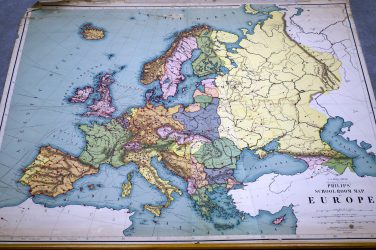The murder of Sarah Everard in London has sparked protests and a broader discussion about sexism, women’s safety, and men’s culpability. Soon, #notallmen started trending on Twitter in parallel to countless women sharing their stories of having felt and been unsafe in the company of men. 6th Sense staff writer Niklas Illenseer argues that indeed yes, all men, are part of upholding the patriarchy and fighting sexism needs to involve them all.
Sarah Everard disappeared and was raped and murdered a little over two weeks ago. Many were quick to point out that she did everything ‘right’, such as wearing flat shoes and checking in with her boyfriend. Her murder is a tragedy, but by no means a singularity. I don’t think I have any close female friends that haven’t been in a frightening situation on their way home at night.
Being a woman seems to involve a constant process of bargaining, having to choose between liberty and security (the same goes for trans or gay people and is even worse for women of colour). Sarah’s death is a chilling reminder of the compromised safety of women everywhere, both outside and inside their own homes. In the wake of her murder, the narrative has rightfully focused on the many horrendous experiences of women. As men, a big chunk of the work we can and must do is listen. But unlike the scarcity of male voices on the issue might suggest, it definitely should not end there. Men, we need to talk.
Men, we need to talk.
The past days have been filled with discussions on women’s safety. Women have painfully reminded us of the many ways in which they have to modify their lives because of the very real danger of harassment, assault, or worse. But when framing the issue this way, we forget that compromised safety in itself is only a symptom – and male violence is the root.
Language is always creating and shaping reality and the more we talk about this in passive terms, the more we conceive it as something happening to women rather than something someone is actively doing to them. It is not violence against women, it is male violence. It is not women getting raped, it is men raping women. Linguistically omitting the active agent not only has an effect on how we lead the discussion but also on what conclusions we draw. Making women responsible for their own safety shifts the blame away from men. This way, the fight against patriarchal oppression, objectification, and violence remains women’s job when it should also be the pursuit of men.
Not all wasps sting, not all sharks bite
The moment we start to talk about these things, one can be sure that mentions of #notallmen or similar remarks adorn the comment sections and derail the much-needed conversation. No one is seriously suggesting that all men are killers and rapists. Whoever hears this is not listening. Not all men are inherently abusive, not all men are inherently dangerous. Yet, that does not make #notallmen a valid argument, quite the opposite.
All men benefit from the systematic oppression of women – and no man can exempt himself from it.
First of all, statistics tell a very different story. While it might not be all men, it sure seems to be an awful lot. Again, no one is suggesting all men are rapists, but we need to move beyond seeing these men as a couple of exceptions, as individual perpetrators, and start seeing them as typical. Typical for the misogyny, the cultural osmosis of male dominance that seems to spur the feeling of superiority fuelling assaults.
Beyond that, the hashtag and what it stands for construct the unhelpful image that while there are some bad apples (the sexists, the misogynists, the rapists), many other men are already confronting their privilege, acknowledging sexism, and actively fighting for equality. Yet, all men benefit from the systematic oppression of women – and no man can exempt himself from it. Men, much like everything else, exist not in isolation but within the environment that shapes them.
While not all men are malicious, the way in which men are socialized is. While not all men are perpetrators, the ways in which we are patriarchally raised instils the potential to become one in every man. These predators are unveiling the destructive ways in which misogyny manifests itself, a system that continues to privilege men and disadvantage everyone else. Memes on social media drew a comparison to the wildlife: when you see a single wasp, you panic. Not because that single wasp is actually going to sting you, but because you know it could. This chilling effect transpires: even if the wasp won’t sting, even if a man doesn’t turn out to be a perpetrator, women are more likely to decide to stay home or go home early, refrain from disagreeing with a male superior, and avoid an office environment that feels risky or unsafe.
“Men don’t have to be rapists to be part of the problem”

When I talk about the ‘patriarchy’, part of it concerns the way in which internalized misogyny penetrates our every doing. As a consequence of this patriarchal socialization, masculine power resides in every choice and value judgment; masculine power has been backed and reinforced throughout history and is projected on all of history. This environment nurtures and cultivates men who try to get women drunk on a date or who make rape jokes, men who pressure girls into using no protection or secretly remove condoms, men who see dating as a game and who view sex as a due reward if they are nice enough – and men that don’t call their friends out for any of this.
Even if we are not harassing women does not mean we are not passively contributing to sexism. By not intervening, not confronting friends, and not standing up against oppression when we find doing so obtrusive, we make ourselves complicit and contribute to the reasons women develop a categorical distrust against men.
There lies a wide gulf between not being an assaulter and being an active ally. While women might not frequently encounter outright physical violence, they more often than not experience a lack of support, particularly when it comes to men standing up for them in men-only spaces. They can neither trust a dangerous-seeming man in a back alley nor trust the men close to them to be outspoken allies once women leave the room. This behaviour is part of the larger issue. It feeds into the machinery that keeps patriarchal oppression going. Men don’t have to be rapists to be part of the problem.
Emotional illiteracy goes a long way
Men usually face an empathy gap, also because of their inherited patriarchal socialization. They often lack emotional vocabulary, and they are not over-endowed with empathy either, emotionally flaccid if you will. Obviously, men are not inherently destined to be unemphatic, we simply don’t teach young boys to feel deeply for and with others, at least not as much as we do with girls.
Throughout their lives, men learn that moving through the world with a sharp sense for competition rather than cooperation is rewarded. Setting up an emotional bunker is socially sanctioned. Though often rooted in good intentions, even the ways in which men are taught to love, care and adore women are saturated with harmful assumptions and stereotypes: creatures to be won over, to be protected, and so on. Seeing women as frail and feeble beings instead of objects might be marginally less destructive, but women are still made to be “the other”, cast in the role of the fragile. It still implies that men deserve to ‘get women’ if they are nice and treat them ‘right’.
The default must default
The fact that men shy away from seeing themselves as one group, a collective, a community is no news. They never had to see themselves as a homogeneous community because men were always the default; white, straight, abled, cis men to be exact. In order to fight for equality, other groups necessarily had to develop a group identity; men did not. Maybe this is the reason even the slightest mention of ‘identity politics’ often triggers male opposition. But in fact, we all produce and pursue identity politics, men are just not used to seeing it this way. Although usually only emancipatory discourses are marked as identity politics, our hyper-masculine world has been driven by the rawest form of it all along: setting heteronormative ‘male’ identity as the default.
Not all men are bad. But all men are part of a system, a culture that privileges them. They have the luxury of usually not having to worry too much about such psychological and physical violence, of not being forced to fully confront the scope of the problem. Of course, there are situations men feel unsafe too, for example for holding hands with or kissing another man. Identities are not exclusive, they overlap and are mutually constitutive. But that does not mean that men don’t enjoy certain gender-based privileges vis-à-vis women.
Breaking down systems of oppression is complex, but it starts with analysing our own place in them – and reflecting on our at times unconscious complicity. Fundamentally, yes, the issue lies with the way we socialize and teach boys from a young age. Preconceptions and values are formed early on.
We can only break the shackles of patriarchal oppression if we do both, acknowledge the individual responsibility of sexist perpetrators and reckon with the systematic nature of sexism. And yes, that includes all men.
Cover photo by Michelle Ding (Unsplash), Unsplash licence








Show Comments
Comments are closed.